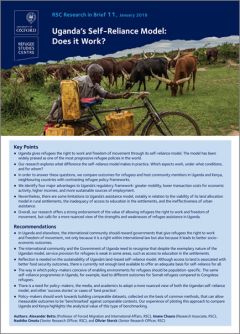Research in Brief: Uganda's Self-Reliance Model: Does it Work?
Alexander Betts, Imane Chaara, Naohiko Omata, Olivier Sterck

Uganda gives refugees the right to work and freedom of movement through its self-reliance model. The model has been widely praised as one of the most progressive refugee policies in the world. New research by Alexander Betts, Imane Chaara, Naohiko Omata, and Olivier Sterck explores what difference the self-reliance model makes in practice. Which aspects work, under what conditions, and for whom? In order to answer these questions, they compare outcomes for refugees and host community members in Uganda and Kenya, neighbouring countries with contrasting refugee policy frameworks. They identify four major advantages to Uganda’s regulatory framework: greater mobility, lower transaction costs for economic activity, higher incomes, and more sustainable sources of employment. Nevertheless, there are some limitations to Uganda’s assistance model, notably in relation to the viability of its land allocation model in rural settlements, the inadequacy of access to education in the settlements, and the ineffectiveness of urban assistance. Overall, the research offers a strong endorsement of the value of allowing refugees the right to work and freedom of movement, but calls for a more nuanced view of the strengths and weaknesses of refugee assistance in Uganda. The research on which this brief is based is published in longer form as 'Refugee Economies in Uganda: What Difference Does the Self-Reliance Model Make?'
